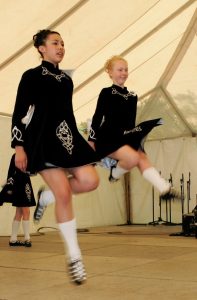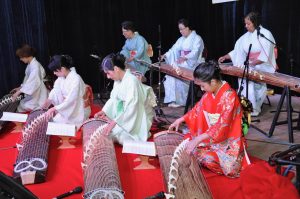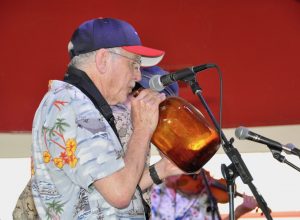Mia Gardiner and Carol Lite have discovered talent in the strangest of places — including taxicabs. Gardiner, who organized the first Washington Folk Festival in 1981, recalls a serendipitous meeting with an Eritrean cabbie who had a friend, new to the capital region, who was something of a musical legend back in Africa.
“[Asking] ’Do you know any musicians from your country?’ is your lead question,” Gardiner said of the quest for new talent ever since. “We’ve found many international groups that way.”
Not only taxis but ethnic restaurants, “friends of friends” and even neighbors have led Gardiner to some of the best artists to be found in the nation’s capital, thereby lending the Washington Folk Festival a truly international pedigree.

Now in its 38th year, the 2018 festival will bow Saturday and Sunday, June 2 and 3, offering festivalgoers a chance to get a taste of the world’s culture, dance and music without ever leaving home.
“Folk music represents traditions from all around the world and from many parts of the United States,” said Lite, a fellow board member who joined Gardiner in programming the festival a few years after its inception. “And because we live in the Washington area, we have a lot of international groups living and working here.”
Two days of free entertainment in Glen Echo Park will allow attendees to enjoy dozens of different acts performing on seven stages. One stage focuses specifically on storytelling and another on participatory dance that draws audience members into the fun. Middle Eastern dancers and Irish folk singers will take turns with musicians representing traditions as varied as Sephardic Jewish and North Indian.
On the domestic front, Gardiner and Lite maintain it was also important to cull acts from around the United States, especially considering that Washington, D.C. was one considered the “bluegrass capital of the world,” Lite said.
“The first time I saw clogging, which is Appalachian dance, was at Jimmy Carter’s [1977] inauguration at Union Station,” Lite recalled, adding that although clogging will be absent this year, its primacy at past Washington Folk Festivals shows how important is it to the mountainous region of the eastern U.S., where many immigrants of Scottish and Irish extraction settled and brought with them the music and dances of the old countries.
Performers from around the capital region this year will include Paint Branch Creek of Columbia, Maryland, and Kentucky Avenue from Washington, D.C.
Garinder, a native of Chicago, said she and some friends from the Folklore Society of Greater Washington came up with the idea of the festival in the late 1970s based on what they believed was a “real need” to have more folk music in and around the nation’s capital.

“There were several other wonderful festivals in town [bringing in] performers in from all over the country, and we knew how many really good traditional musicians were available right here in the Washington metropolitan area,” Gardiner said. “And so, we thought what fun it would be to have a festival that featured our local musicians.”
The first iteration of the Washington Folk Festival took place in 1981 as a single-day event at Glen Echo Park. The event became so popular that it has been a weekend-long fete ever since — and continuing at the same venue.
In addition to regularly inviting back several popular performers, Gardiner and Lite spend months screening new potential acts for the lineup. The women are proud of new additions this year including flamenco dancing and bluegrass groups as well as hip-hop music, which, over time, has gained acceptance as part of the traditional American musical mainstream.
“We don’t just have anybody come; we have to be sure they are stage-worthy, that they are experienced or good enough to be presented,” Gardiner said. “That doesn’t mean that they are necessarily professionals; they’re not.”
Indeed, many of those who perform at Washington Folk Festival have day jobs ranging from doctors to physicists and even some who work for NASA. No one is paid. Everyone — festival runners and performers — volunteers their time. “This is their hobby, but they do it seriously and they’re good at what they do musically,” Gardiner said of the nonprofessionals and professional acts alike.
Lite said this year also will feature a special presentation called “I Am an Immigrant” in which newcomers to America will talk about life in their home countries as well as the artistic traditions they have brought here. “We’re having it for the second year because it was so popular last year,” Lite said.

Gardiner, who is “in the process” of retiring from programming the folk festival, said her weekend will consist of shepherding performers from backstage to their performance slots and then on to special meet-and-greets.
“We meet the performers, get them signed in, get them their name tags and introduce them to the stage managers and the emcees,” Gardiner said. “When we can, we try to stay around and enjoy some of the music before we run back to the office to meet the next group.”
Both Lite and Gardiner believe that the Washington Folk Festival offers a fine weekend for people to discover not only the sounds from around the world but also the talents of their friends and neighbors. “I feel that the [idea] we came up many years ago was bringing Washington its own music,” Gardiner said. “And we are still bringing Washington its own music. These are your neighbors; these are people who live down the street from you.”
“Many people will hear performers for the first time [and] find out where that performer is performing subsequent to the festival and go hear them,” added Lite. “So, it’s a way of introducing the audiences to the performers, but it’s also a way of getting the performers more widely known if they are not already.”
Asked about the festival’s future, Gardiner, its founder, hedges — possibly due to her stepping down from the organizing committee — but says nonetheless that she remains proud of the successful run the Washington Folk Festival has enjoyed thus far.
“It was something that was just a good idea and kind of a lark, and let’s do this for fun one time, that turned into a wonderful 38-year run,” she said. “So. we’re very proud of it and hope you can attend.”
The Folklore Society of Greater Washington and the Glen Echo Park Partnership present the 38th Annual Washington Folk Festival from noon to 7 p.m. on Saturday, June 2 and Sunday, June 3 at Glen Echo Park, 7300 MacArthur Blvd., Glen Echo. Admission is free.
Visit www.fsgw.org/washingtonfolkfestival for schedule.